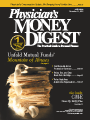Publication
Article
Relax, Doc, and Step Back from the Edge
Author(s):
Journal of the AMA
A recent study published in the , "Coronary Artery Risk Development in Young Adults (CARDIA) Study," examined the risk of heart disease in patients who had the following psychological risk factors, namely:
- Time urgency/impatience
- Hostility
Making Yourself Sick
The authors concluded that patients with these psychological characteristics were at risk of cardiovascular disease twice as much as those who did not exhibit the characteristics. Such psychological states led to increased sympathetic nervous system stimulation, increased cardiac output, vasoconstriction, arterial pressure elevation, impaired endothelial function, platelet activation, hypercortisolemia, and endocrine dysfunction—conditions known to lead to cardiovascular disease.
Imagine, a person's psychological state can make them physically sick. Interestingly, the authors failed to note that these psychological characteristics are the norm for those doctors conducting the study. I wonder if they saw the irony. The same damaging psychological characteristics probably exist in the doctors reading the article—including you and me.
Physicist and medical theorist Louis Constan, Jr, MD, who happens to be my son, has developed equations to measure a physician's lifetime professional success: S ~ E x P, where S = success in practice, E = effectiveness (ie, skill, knowledge, and experience), and P = patient visits. A brilliant physician with a short career may be considered less successful than an average physician who manages to have a long career simply because the "P" for him is much bigger.
Vacation Justification
We now have a scientific explanation as to why you should take a nice, long vacation. Let's face it, my doctor friend, you're living on the edge. By virtue of the fact that you went to medical school, trained in a residency, and now successfully practice medicine, you learned some stressful psychological habits, which put your health at risk. You could become sick at any time.
You need a vacation so that you can lower the levels of your serum cortisol, rejuvenate your endovascular endothelium, lower the hyperactivity of your sympathetic nervous system, and decrease your cardiac output. A vacation will do this, allowing you to be healthier, live longer, see more patients over the long run, and be a more effective physician. The catch: A vacation is only effective in prolonging your lifespan and health if it is used to modify those aforementioned psychological risk factors. Let's consider each one.
Examining Symptoms
• Time urgency/impatience. If your vacation is a whirlwind, one-week trip to every Civil War battlefield, you may not be achieving your goal to lower stress hormone levels. You'll be in a hurry to get to your next stop, cursing traffic and whipping through the exhibits. Such a vacation doesn't qualify as an activity that will prolong your life. You may want to go on such a trip for educational purposes or for the benefit of your children, but it doesn't qualify as the vacation you need. The same can be said for combining a vacation with a medical conference, cramming in too many activities.
You'll know if you've achieved victory over time urgency/impatience when you enjoy yourself while waiting to be seated at a restaurant, when you get up in the morning whenever you want and don't immediately start thinking about what you must do, and when you hang around the beach for hours for the sole purpose of enjoying the sunset over the ocean.
• Achievement striving/competitiveness. You would not want to enter the America's Cup race on your vacation, race model airplanes, or engage in competitive sports. These are all competitive activities, and the study shows that such activities can cause cardiovascular disease. Golf may or may not be such an activity. If you're intensely keeping score, you're not decreasing your psychological scores—and perhaps not your golf score, either.
You'll know you've achieved victory over striving/competitiveness when you don't care if someone passes you on the highway, cuts ahead of you in a line, or flaunts their flashy designer clothes or expensive luxury car in front of you.
• Hostility. You spend your professional life upset with insurance companies, plaintiffs' attorneys, and government bureaucrats. Leave those thoughts behind you on vacation. You may not want to consider a visit to the Capitol if you find yourself stewing over the goofy things that go on in those places. You may not want to relax by watching television at your condo in Florida, where every second commercial is a lawyer advertising a willingness to help the viewer sue their physician.
You'll know that you've achieved victory over hostility when you look around and feel a sense of love and care for everyone. You hold that door open for the person behind you. You smile at a stranger and find their chatter interesting or amusing.
Looking at the Cost
A lot of doctors I know bemoan the fact that when they go on vacation, they can't be making money in their office, while much of their overhead continues. I propose that they adjust their thinking. In light of this medical study, they can expect that the vacation will actually pay for itself. I've "run the numbers," which prove that each dollar you spend on a real vacation, according to the principles we have just discussed, will return $9 in extra lifetime income accumulated because of less personal illness, consequent time spent away from work, and premature retirement.
Do you see why you should go on that vacation now? The vacation actually pays you back many times for the money you invest in the trip.
Louis L. Constan, a family practice physician in Saginaw, Mich, is the editor of the Saginaw County Medical Society Bulletin and Michigan Family Practice. He welcomes questions or comments at 3350 Shattuck Road, Saginaw, MI 48603; 989-792-1899; or louisconstan@hotmail.com.
